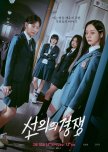
This review may contain spoilers
A Chaotic, Twisty Drama Where Everyone Needs Therapy or Jail
Everyone in this drama either needs therapy or jail. And honestly? I enjoyed it.This drama is about high schoolers doing things they normally wouldn’t—crossing moral lines, making impulsive choices, and spiraling into chaos. It starts when Seulgi transfers to an all-girls school in her final year before the CSAT exam. There, she meets Je I, a rich girl who is dangerously obsessed with her.
From the start, it was clear this wasn’t going to be a simple school drama. It had an intense atmosphere, filled with mystery, psychological tension, and a sense of unpredictability that kept me hooked. I won’t pretend I fully understood everything that was going on, but the drama was undeniably entertaining. It threw in countless twists, and the characters made so many drastic U-turns that some of their actions stopped making sense. Still, I kept watching, trying to piece everything together.
➽Cinematography & Symbolism: The Art Behind the Chaos
One of my favorite parts was how each episode introduced the characters—it was so cool and stylish. The cinematography was visually stunning, and the metaphors were clever and fun to analyze. One of the best examples was the way they portrayed drug use—particularly the scene where Seulgi was studying "underwater." The imagery perfectly captured her struggle, making it one of the most memorable moments for me.
I also loved the use of water symbolism throughout the drama. It played a significant role in representing emotions, escapism, and control. Je I’s room, with its sea theme, was such an interesting detail—almost foreshadowing how water would eventually become her final escape.
➽The Storytelling: Messy But Addictive
The storytelling was good but chaotic. At times, it felt weird and rushed, as if the drama was trying to do too much at once without giving enough time for proper closure. Some plot points were hard to follow, and a few character motivations didn’t entirely make sense. But despite all of that, I couldn’t stop watching. Even when things felt confusing, the intensity and unpredictability made it gripping.
➽Relationships: Obsession, Love, and Moral Ambiguity
The dynamic between Seulgi and Je I was one of the most intriguing parts of the show. There was no clear, straightforward explanation for their relationship, but one thing is for sure: they looked at each other in “lesbian.” The tension, the obsession, the unspoken emotions—it was all there.
Then there’s Yuri and Choi Kyeong, who were a surprising but welcome addition to the story. Their relationship and interactions brought an unexpected layer to the drama, and I really liked how their storyline unfolded.
➽Acting: A Standout Cast
One thing I have no complaints about is the acting. Every single actor did an amazing job. The intensity, the emotions, the psychological depth—it all came through in their performances. Whether the characters were unhinged, desperate, or manipulative, the actors made every moment feel real.
➽ Je I’s Father: The Real Villain of the Story
If there’s one character that deserves to be called truly evil, it’s Je I’s father. He wasn’t just strict—he was a full-blown control freak who locked up his own daughter and treated her like a puppet. He was so obsessed with power and perfection that he completely broke both his daughters, pushing them to the edge of sanity.
The moment Je i finally escaped him by throwing herself and her sister into the sea was both tragic and symbolic—water became her final act of defiance, her way of taking back control.
➽I thought the ending was fine—beautiful and fitting for the drama's vibe. Honestly, I wouldn't have wanted it any other way. It felt somewhat closed yet still open.
➽Final Thoughts: A Wild, Messy, Yet Engaging Ride
This drama was far from perfect. It tried to do too much, leaving some things confusing and unresolved, but despite its flaws, I enjoyed the ride. The psychological depth, the symbolism, the intense relationships, and the cinematography made it a compelling watch.
It might not be for everyone, but if you enjoy dramas with complex characters, psychological tension, and a touch of chaos, this one is worth checking out.
Was this review helpful to you?

Didn't Work For Me
I didn’t like this, unfortunately. It just didn’t work for me. All it really had going for it was the great acting, some nice visuals, and solid chemistry between the leads. That’s it. The plot and story were just bad. I found myself skimming through a lot of it, to be honest.The first episode was intriguing and gave me some hope, I was actually looking forward to the next one. But it just went downhill from there. Each episode got worse plot-wise. I don’t mind men crying (actually, I like it), but I do mind the main lead going through some new trauma every single episode, over literally nothing, and then the issue just gets dropped like it never happened, just to make space for the next. It got tiring. I considered dropping this way too many times but stuck around purely for the leads.
And seriously, if your NC scene is the best scene, that’s not a good sign.
Speaking of, the way this show handled sexual assault was disgusting. It was used as a plot device and then brushed off like it was just cheating??? No. That’s not cheating — it’s rape. Whether they end up sleeping together or not doesn’t change that. And of course, like always, the predator faces zero consequences. The whole Johnny arc made me so mad I literally dropped the show when it was airing. I only came back a month later because everyone kept calling it a masterpiece. (and too many smart boom videos on my fyp)
Also, sorry but… I found Jin a bit creepy too.
So yeah, all I have to say is: the plot was TRASH.
But, credit where it’s due: the acting, especially Boom was great. The leads had really good chemistry, like they genuinely fit. The visuals and cinematography were mostly nice. Some of the outfits were nice.
And Naru was an absolute cutie. I just had to say it.
Was this review helpful to you?

A "Healing" Slice-of-life That's Worth Watching
This is a slice-of-life drama that doesn’t necessarily heal you, but it makes you wish for everyone to heal, physically and emotionally.I went into it with low expectations even though I’d been waiting for it, but surprisingly, it turned out to be a wonderful watch.
When Lee Hyori finds out she’s seriously ill, she drops out of med school and runs away to the countryside to rest. Her mom follows her there, determined to take her back… and that’s where the mother–daughter story begins. Their relationship isn’t the best at first, but over time, watching them slowly mend and grow closer is truly heartwarming.
There’s also romance woven in: Ryu Jeong seok, Lee Jian’s first love, and Ryu Bo hyeon both live there, and each develops a love line, one with Jian, the other with Hyori. It might sound complicated, but it never feels awkward or forced. This isn’t a rom-com, though; it’s more about found family, quiet healing, and the kind of emotions that sneak up on you until you suddenly find yourself in tears.
I especially loved Kim Sun young’s character, she was funny when needed, but also a deeply supportive friend to both Jian and Hyori. She brought so much warmth and chaos to the story.
The romances were also beautiful: Bo hyeon and Hyori were absolutely adorable together, and Jian and Jeong seok had their own lovely journey. But more than anything, I loved watching all the characters grow, little by little.
This is the kind of drama you sit back and relax with, only to realize you’ve been moved to tears. Even though they squished in some annoying drama, It is ruly worth giving a chance.
Was this review helpful to you?

This review may contain spoilers
This show isn’t flawless, but it’s perfect for me.
It’s the kind of story that doesn’t march from beginning to end, but opens itself from all directions, letting moments and truths surface until they meet at one point.It carries a bittersweet soul, but the bitter stands bold. Even in the lightest scenes, there’s a shadow, a sadness that lingers no matter how much the characters laugh.
Everyone here has their own path, their own choices, regrets, and mistakes. There are no pure heroes, no clear villains. They’re just human, too young to know if what they’ve done is forgivable and old enough to be responsible for their own actions.
Zhen Zhen is not the type of female lead I usually enjoy. In her shoes, I would have chosen differently every single time. But I understood her. I felt her pain so clearly it almost bled through the screen. Yin Rui gave her such depth that there were moments I wanted to step inside the story just to hold her for a moment, to let her breathe.
Jiang Ling, too, isn’t my usual favorite type, the cold kind who gradually warms. But he’s more than that. Literature runs in his blood; books and words shape him. Watching that part of him was a quiet joy, especially when you catch the little foreshadowings hidden there. He cared for Zhen Zhen in his own way, guarded their friendship, and carried his own grief. She became the color in his grey world, even while hers remained grey. And when we see his perspective, poetic, precise, remembering the smallest things about her; it gives their bond an even richer shade.
Gu Ming is the class president everyone likes, but beneath that smile is a tangle of pain that pushes him toward choices you can’t quite call right.
Qiu Qian is another one, in another drama I’d call her a villain without hesitation. She’s done so much wrong it feels strange to pity her, yet I do. She’s just a young girl trying to survive, and the show redeems her in such a quiet way I didn’t even notice it happening.
Qi Shuo is similar, his actions almost unforgivable, yet I can’t see him as purely bad, just another victim of what adults can do to the young.
The friendship between them felt whole and warm, which made watching it fall apart all the more painful, even though you can sense from the start that it will. Seeing their adult selves, still carrying the weight of lost youth and unrealized dreams, adds another layer of ache.
The two timelines run side by side: older Jiang Ling speaking to a Zhen Zhen who never made it past high school. That alone brings a somber note, as if the story is reminding you again and again that their happiness is fleeting. In both timelines, joy never seems to stay.
This is not a love story, but the bond between Jiang Ling and Zhen Zhen is tender, innocent, and threaded with a quiet ache. Every little interaction between them is soft, even sweet, yet there’s always the bitter aftertaste. I’ll think of them every time I eat noodles now, noodles that marked a beginning, a journey, and in a way, an answer.
It’s also worth praising the cinematography and the camera angles, the way the camera lingers just long enough to let the emotions breathe. The styling was especially well done for older Jiang. The opening and ending songs fit beautifully, even if the background music within the episodes could have been stronger. The ending felt right. Not the overused kind of time travel resolution, but one that suited the tone and left me satisfied, even in its melancholy.
It may not be flawless, but Fell Upon Me is the kind of story that stays with you , lingering, like a dream you can’t return to. I would absolutely recommend it.
Was this review helpful to you?

Pretty Faces, Problematic Plotlines, and One Very Doomed Little Sister
I just finished watching Netsuai Prince and I don't even know what to say. I'm honestly ashamed of how entertained I was, because this show is wild. It's about Matsuri, a 15-year-old girl who always wanted siblings. One day her mom gets remarried, and suddenly she’s the little sister of the members of her favorite idol group, Terzetto.Now, listen, this already sounds like a fanfic gone off the rails, but it gets worse. Not only is it incredibly cringe, but it’s also deeply problematic.
Let’s start with the basics: Matsuri is 15. The boys? They’re 17 or 18. That alone is pushing boundaries, but one of them is her new stepbrother, and still tries to make moves on her. What are we doing here???
The show plays this off like a romantic fantasy, but it’s straight-up disturbing. Especially Azusa, this man is 17 and literally tells Matsuri he doesn’t see her as a sister. And then proceeds to pin her against walls, kiss her without consent, and just overall act like a walking red flag. WHY is this stepbrother kissing his 15-year-old sister? Why is this presented as romantic?!
And he’s not even the only one! Subaru, the childhood friend turned idol, also crosses lines and does a lot of questionable things.He was a boring character too, it’s hard rooting for anyone when everyone’s out here disrespecting boundaries like it’s nothing.
As for the other two brothers, Haruka and Rihito? Shockingly, they actually treat Matsuri like a sibling. No weird romantic tension, no crossing lines. And I know that sounds like a low bar, but in this drama, that practically makes them saints.
Yamato, though? Now that one’s complicated. He had the most personality, the most layers, and honestly was fun to watch. Did he also cross lines sometimes? Yeah, unfortunately. But it felt less aggressive and more playful, not perfect, but tolerable compared to the other two. If she had to end up with someone, I would've preferred Yamato just for the character depth and dynamic. (Still not ideal, though.)
And here’s the real tragedy: this show could have been amazing if it just focused on family and friendship. Matsuri adapting to her new family, navigating idol life from the inside, bonding with her brothers, that would’ve been wholesome and unique.
Even the group dynamics between Terzetto and Prism were fun to watch. The rivalry felt genuine but healthy, and the friendships felt real. But then they had to throw in the “I’ll steal your sister from you” stuff and ruin the vibe.
Also… where are the parents? Why are all these minors just unsupervised and living alone in a giant house like?
In the end, Netsuai Prince is pretty faces, decent idol music, and a story that had potential, and then set it all on fire in the name of forced romance and creepy tropes. I would've rated it way higher if the romance was cut and it just focused on growing sibling bonds and idol life. But nope.
Please someone save Matsuri from these men.
Was this review helpful to you?
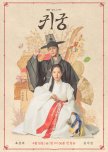
This review may contain spoilers
Dragged at times, But I don't regret watching
This drama started off strong. Episode 1 pulled me in with an intriguing setup, Yeori, a reluctant shaman and glass craftswoman, and Kang Cheol, an Imugi who needs her body to ascend. The tension was there, the atmosphere was moody but engaging, and the characters actually had charisma. Young Kwang as the original Kang Cheol had presence, and even though we lost him early, Sungjae stepped in as Kang Cheol/Yun Gap with such smooth synchronization that I didn’t even mind the transition.The first few episodes really had me. There was just enough emotional pull with Yeori’s desperation to save Yun Gap, the painful irony of being stuck with someone who looks like the man she loves but isn’t, and the layered tension between her and the Imugi. I loved that Yeori wasn’t written as some superhuman fighter, but she also wasn’t weak. She held her own. The scenes with her helping spirits, especially the rape victim, were emotional and gave her some moral grounding that made her compelling. And the scene where Kang Cheol possessed Yun Gap’s body, leaving behind a ghost version? The acting was so on point I was genuinely impressed.
Let’s talk Bibi. Absolutely hilarious, unhinged, chaotic sibling energy to Kang Cheol. No DNA test needed. I knew the moment he appeared that he was going to die. Side characters with that much personality and power never last. But at least his death made sense. It wasn’t some weak “sacrificing for the leads” moment. It was him trying to prevent Kang Cheol from sacrificing himself, trying to play smart, and still falling into the trap. A tragic death, but fitting for his character. Though his death could've been prevented if any of the three were a bit smarter or faster.
The romance. Usually I hate the whole “immortal loves mortal he’s watched grow up” angle. But here? It made sense. Kang Cheol didn’t start out feeling anything, it wasn’t until he possessed a human body that he started feeling at all. Watching him fall in love like some goofy teenager was honestly adorable. His excitement over Yeori’s confession, buying her shoes she once looked at years ago, giving Yun Gap’s mom a hairpin, it was giving dumb in love Imugi energy and I wasn’t mad about it.
The King. Honestly was a standout. He actually ruled. He wasn’t some cardboard noble with no agency. He fought. He bled. He made decisions. He loved his wife. He had his moments of failure, but he owned them. His scenes with Kang Cheol were often some of the best, especially once he knew who he really was. And the bromance? Legendary. That man hugged, protected, and actually talked sense. More of that in dramas, please.
Now, about the pacing. Around episode 8, I started feeling it. The drag. There were filler moments, scenes that felt like recycled dialogue or slow-motion glances stretched way too long. The writing dipped, the tension started unraveling, and I began questioning if they were just making it up as they went.
Yun Gap comes back and for a hot second, I thought they were going to ruin him. But no, he stayed true to himself and got a proper send-off. The drama made the right choice there.
And then close to the end was a mess. Every character suddenly turned into a brainless statue. Evil right in front of their faces and no one moves. No urgency, no logic, just standing around as if they’re all reading the script together. Queen Park’s death? Unnecessary and frustrating. She deserved better. We all agreed this show could’ve been wrapped up in 10-12 episodes max. Dragged out way too long.
The finale, though? Surprisingly satisfying. Kang Cheol sacrifices himself to defeat the Eight-Foot Spirit, meets the Jade Emperor, and gets a second chance. Not mad at that. Yeori and Kang Cheol get married, have a daughter, and continue their ghost-hunting and glass-making life together with Yun Gap’s mom still being the funniest person around. The tone shifted into a light epilogue and honestly, it worked. It felt like a reward for sitting through the messier middle arcs.
So yeah. This show didn’t need 16 episodes. The writing faltered, the pacing dipped, and there were moments where I was just watching out of obligation. But the characters, the emotional arcs, the Imugi lore, the bond between leads, and that surprisingly good bromance, there was something here. Not perfect, but not bad either.
Started out as a 9. Dropped to a 7.5. Worth a watch if you're in the mood for chaotic romance, spirits, glass art, and a lizard god learning to love.
Was this review helpful to you?
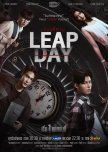
Day and Night are Inseparable
Leap Day has a really intriguing premise, two boys, Day and Night, born on February 29th, are cursed to lose someone they love every leap year. It's a heavy and emotional idea, and I was immediately drawn in by the concept of them carrying so much grief and guilt over the years.That said, the execution didn’t fully live up to the potential. A lot of the time, the story lacked logic, and they often explained things that were already pretty obvious. It felt like they had enough solid material for about six episodes, but then tried to stretch it to twelve, which made parts of it drag and become a bit boring.
Still, I did enjoy some moments and would say it’s worth watching, just go in with low expectations. What I appreciated the most was the cast and the dynamics between the characters. The brotherly love between Ozone and Day was genuinely heartwarming and probably the best part of the show for me. I also really liked Dream and Night as a couple. And the Overall friendship between all four.
Was this review helpful to you?

This review may contain spoilers
"Existence Is Just Existence"—But It Takes Courage to Accept That
Masterpiece (noun): A work of outstanding artistry, skill, or workmanship.I believe "masterpiece" is just a word—simple on its own, but complex in meaning. It shifts shape depending on who’s holding it. Some might say there’s no such thing, that perfection is too subjective to exist. But if I ever had to call something a masterpiece, it would be this.
This wasn’t just a drama. It was an experience—brief in time, but vast in depth. Something that settled into my chest and expanded until it touched parts of me I hadn’t realized were waiting. I won't regret watching it. I won't forget it either.
I began it, admittedly, for the poster. Simple, clean, with a quiet kind of pull. I’ve always had a soft spot for aesthetic bait. But what I found was something else entirely—something that reached beyond the surface, that refused to just be seen and instead insisted on being felt.
It was beautiful—not in the fluffy, feel-good way—but in the way something truthful is beautiful. Not cute, but sweet, like fruit with a bitter peel and a soft, ripe heart. Then again, is life ever truly sweet? Or do we only think it is when the pain is paused, the ache dulled for a moment? Maybe sweetness is just what we call less bitter days. Maybe, if there's lychee, we accept it as enough.
Visually, this was art. The colors were so alive—each frame could be paused and framed, every shot a painting. It wasn’t just cinematography, it was design, intent, emotion painted in pixels. The way lighting shifted with the mood, how symbols were tucked into corners, how the island setting became a character of its own—it all pulled me in.
I also couldn’t help but notice how the drama seemed to draw visual and thematic inspiration from the works of David Hockney—an influence that felt both subtle and deeply intentional. From the colors to the composition, it echoed his art in a way that made each frame feel like something painted rather than filmed.
There’s a moment where Chen Li is swimming in the pool while Xiao Zhi watches him from a distance, and it instantly called to mind Hockney’s “Pool with Two Figures.” That tension between the observer and the observed, between longing and restraint, was captured with such elegance. They even mention Hockney by name in the dialogue—such a small thing, but it felt like a quiet nod to the kind of emotional stillness he mastered.
The entire island setting felt like stepping into one of his canvases—vibrant yet soft, detailed yet dreamlike. One of my favorite Hockney pieces, “May Blossom on the Roman Road,” came to mind often. The island carried that same sense of suspended time, with roads that felt like journeys and blossoms that hinted at fleeting beauty. You could feel that idea of something temporary, something seasonal—just like love at the edge of becoming.
Even the trees held his presence. Hockney’s works like “The Tree No.1” and “The Bigger Tree” seem to live and breathe in the background of the drama. The way the trees framed scenes, stood still yet commanding, was so reminiscent of his studies of nature. There was a quiet grandeur to them—almost like they were silently witnessing everything unfolding beneath their branches. At times, it felt like the characters weren’t just moving through an island, but through a painted world—one where nature, like emotion, towered over them and wrapped them in something larger than themselves.
This is a coming-of-age BL drama—and easily one of the best I’ve encountered.
Chen Li, on a summer break he expected to spend idly, ends up entangled with his friend’s younger brother, Xiao Zhi. It begins with care—gentle, brotherly—but evolves. Quietly. Complicatedly. He doesn’t want to feel it, let alone name it. Xiao Zhi, who at first can’t even look at Chen Li in the shower, slowly becomes the one brave enough to cross the space between them.
The acting was nothing short of brilliant. The eyes, the silences, the subtle shifts in breath and posture. Desire hidden in glances. Tenderness caught in the curl of a hand. Their chemistry wasn’t loud, it wasn’t burning—it was real. Soft and slow and deep. A love that didn’t demand to be announced, but quietly insisted on existing anyway.
That breakdown scene—Xiao Zhi after the drink, unraveling in front of his brother—I felt that. Like a punch wrapped in silk. The emotional beats were hit with such sincerity. And the dialogue? Not the kind you'd say over morning coffee. It was thoughtful, poetic, almost philosophical at times. Lines that could have sounded awkward in lesser hands, but here—every word found its place.
I noticed how the color palette shifted too. It started bright, airy, soaked in sunlight. But as the story darkened, so did the tones. Shadows grew. And then, in the end, light returned. Not the same brightness from before—but something new. Something earned.
One scene that carved itself into my memory: the dream. They're running together, hand in hand, through the dark. But when light finds them, they drift apart. Kissing in the shadows, but separating under the spotlight. That scene said so much without saying anything. About society, about fear, about how love sometimes survives only in the spaces we create for it, not the ones we’re given.
This drama didn’t yell to be heard—it whispered. And somehow, that whisper echoed louder than most shouts.
The final kiss—oh, that kiss. It wasn’t just two people coming together. It was a decision. A choice. A declaration. Doubt pushed aside, love chosen in its place. The courage of that moment—it was everything.
I’m not getting over this anytime soon. I don’t want to. It left something with me—questions, warmth, ache, and clarity all at once.
To the entire team behind this: thank you. You created something unforgettable. I’ll be following whatever comes next with a heart still full from this.
If you haven’t watched this yet—or aren’t planning to—what are you even doing?
Was this review helpful to you?

More Filler Than Plot, But Still Fell For It
This was quite an enjoyable ride, although I preferred the earlier episodes over the latter half. The story isn’t particularly new, but it’s not overused either, so it still felt fresh. The pacing is an odd mix of fast and slow, like not much actually happens plot wise, with scenes that feel like filler strung together, but the individual moments are fun and engaging enough that it works.The romance was okay. I really liked how flirtatious the FL was with the younger ML. He wasn’t portrayed as a “cute little brother” type, but as a grown man with childhood trauma, his sad eyes gradually lighting up after meeting her was a nice touch. Both leads felt simultaneously mature and immature, and their marriage felt impulsive. It seemed more like a phase of attraction than deep love, which explains the FL's hesitation. They had some spicy moments, but they came off a bit performative. Still, I enjoyed them as a couple.
The “I kept this secret to protect you” trope is not for me, and unfortunately, ML falls into that trap. It causes FL to lose some trust in him, and since this was supposed to be a mature romance, the conflict didn’t feel satisfying especially since it was predictable (they get married by episode 8).
Acting wise, FL was good, though I wasn’t a fan of her makeup at first, it grew on me eventually. ML had no obvious flaws but wasn’t particularly memorable either, aside from having the face.
I liked the second couple too, though I would’ve loved them more if the SML wasn’t so indecisive about his feelings. The SFL was adorable, both in personality and style. I especially appreciated that she chose to walk away from a marriage that hurt her. Her dynamic with her son was sweet, he’s cute and somehow more mature than many of the adults. SML was honestly hilarious.
The friendship between SFL and FL was one of the highlights of the show. Their bond was precious and deeply comforting, they really felt like soulmates. I love strong, long-term female friendships like theirs.
The grandmas were also a delight. Their scenes didn’t always feel necessary, but they bickered so much and had such good chemistry that I enjoyed every moment they were on screen.
Overall:
Would I recommend this? Yes. It’s not flawless, and the drama has its ups and downs, but it’s a good watch with heartwarming relationships, light comedy, and enjoyable characters.
Was this review helpful to you?

This review may contain spoilers
I know this drama isn’t perfect, but I loved it. Easily one of my favorites.
This drama came out of nowhere and stole my heart. I watched it weeks ago and still think about it. It’s the kind of story that feels like it’s just here to have a good time—and I was so here for it.The premise? Chef’s kiss. A modern-day girl gets isekai’d into a novel and becomes the rich male lead’s scheming little sister. But instead of following the tragic path of the original character, she decides to embrace being the spoiled rich girl who does absolutely nothing except spend her brother’s money and look pretty. And honestly? Iconic. Her first line perfectly sets the tone:
"Good news—I became the ML’s younger sister. Bad news—he wants to marry me to Fu Chuji."
The FL (played by Liu Lan Ge—my first drama with her, and girl SLAYED) was hilarious, lazy, and surprisingly smart. Her whole vibe was “work smarter not harder,” and she had the looks, the brains, and the audacity. I loved her.
But the highlight for me? The sibling relationship. The romance was cute (I’ll get to that), but the bond between the FL and her cold, emotionally constipated big brother absolutely stole the show. Watching him pretend not to care while secretly transferring money to her every five minutes? Adorable. The way he slowly warmed up to her but kept his tsundere energy intact? Loved it. Plus, his insults were elite. I’m still thinking about:
"You can offend anyone here. They’re the ones who need us."
"I don’t hit women, but you’re not one." (Delivered after a character literally tried to drug the FL—savage)
The romance was also a fun ride. I didn’t realize how much I liked hidden identity plots until this one. The ML (Fu Chuji) gets asked by his fiancée—who he’s barely met—to pretend to be a gigolo for money, and he just goes with it, thinking it’s some trick. But of course, he falls for her. And the chemistry? Underrated. He was handsome, confused, smitten, and I loved it.
His brother was lowkey one of the funniest characters too. Constantly trying to take him down, but with limits. Like—he’s cool with corporate espionage but draws the line at actual crimes because “I’m not trying to go to jail” vibes.
Even the side characters like the actor FL helps were likable, and the plot moved fast without ever dragging. Drama knew exactly what it was and didn’t waste time.
And that ENDING.
FL finds out ML’s identity, breaks up with him, and he spirals so hard he says he doesn’t have a reason to live. His brother calls him and says, “I’ve kidnapped her. Come here, kill yourself, and I’ll let her go.”
ML goes. There’s a gun on the table. He lifts it to his head. Pulls the trigger.
Click. It’s fake.
Meanwhile in the next room, FL, her brother, and ML’s brother are casually eating lunch like it’s just another Tuesday.
Absolute chaos. Petty sibling revenge. ICONIC.
And yes, it was FL’s brother’s idea. Because you messed with my sister? I’ll mess with you right back.
All in all, this drama was chaotic, funny, heartfelt, and had surprisingly touching moments. I’m fully aware it’s not a “high quality” production in the conventional sense—but I didn’t care at all. It gave me everything I didn’t know I needed: a smart, lazy FL, great sibling dynamics, a thrilling romance, hilarious lines, and that satisfying ending.
10/10 for me—because sometimes, you just vibe with a story, and that’s enough.
Was this review helpful to you?
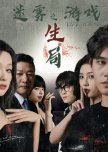
This review may contain spoilers
The Villian Roundtable I Knew I needed
This drama had me hooked—every twist pulled me deeper, and I couldn’t wait to see what happened next. It’s intense, full of dark secrets, and the tension never lets go.That said, it’s definitely not a comfort watch. As much as I was glued to the screen, it’s not something I’d watch twice. It gets real dark, and stays there.
Content Warning:
This drama contains graphic violence, sexual assault, suicide, emotional abuse, revenge porn, and psychological trauma.
PLOT (aka: The Craziest Group Therapy Session Ever):
Five strangers wake up in a creepy locked room. A distorted voice tells them to confess their past with a man named An Ke, or they'll get stabbed—literally stabbed in the hand—for every lie they tell. Easy enough, right?
Wrong.
They each tell tragic sob stories about being manipulated by An Ke: He stole their money, broke their hearts, ruined their lives… But something’s off. The masked stabbers start handing out wounds like party favors, one per lie. And , do these people lie.
Turns out? They’re not innocent. They’re monsters in Gucci belts.
CHARACTERS (aka: Villains Assemble):
Lin Ru Yu – The “strong businesswoman” icon admired by young girls… who also marries rich old men and mysteriously inherits their fortunes. She says she doesn’t rely on men—she uses them. Cold, fabulous, deadly.
Gu Nuan Nuan – The ballet teacher by day, sugar baby by night. She plays the fragile sweetheart card, but in reality, she dates multiple men for cash—one of whom unalived himself. Oops. Oh, and she ruined someone’s academic future out of petty jealousy.
Huang Jia – An Ke’s “best friend” and the actual lost son of a rich CEO. But his origin story is a horror movie: abused, manipulated, then exploited in college where he got raped by older women in a "honeytrap" scheme. He spirals into a revenge-porn empire, filming women in hotel rooms. An Ke shut it down. Cue the drama.
Chairman Li – CEO, mob boss, womanizer, and all-around worst dad. He abandoned his son (who's in the room!), used violence to build his empire, and almost landed in jail thanks to An Ke. No sympathy here.
Liang Meng – Sweetest backstory… or so we think. She “died” early in the game. She once saved An Ke on the roadside, fell in love with him, and then—he left. Heartbroken. Ruined. Obsessive. She stalked him. Watched him get close to others. And when she couldn't have him—she decided to destroy him. Cue mastermind reveal.
An Ke – The puppet? Or the puppeteer? Nah—he's the poor guy just trying to survive debt collectors, raise his sick sister, and avenge his best friend. He infiltrated these monsters' lives to get justice—but now he’s the one getting played. Again. But there is no denying this was all partly caused by him.
The Twist (and it’s GOOD):
Everyone thinks An Ke is behind this whole deadly “confess-or-die” game.
He’s not.
It’s Liang Meng.
She faked her death. Sat behind the curtain. Pulled the strings. Not because she wanted justice—but because she wanted An Ke to suffer. She didn’t like the people he surrounded himself with, and when she couldn’t have him… well, she decided no one could.
Ultimate ex-girlfriend villain energy. Gaslight. Gatekeep. Girlboss. Stab. ( I'd be lying if i say Didn't expect to be, because there is just no way they cast her for a minor role.)
The Final Round (aka: Fight Club with Tears):
They get one last chance: Kill An Ke’s little sister to survive.
They try.
An Ke breaks in, all chaos and blood.
Everyone dies in a brutal, messy showdown.
Liang Meng dies in An Ke’s arms, learning the truth—that he left not because he didn’t love her, but because life chewed him up. She cries. She bleeds. She dies.
An Ke survives, gets arrested, but his sister promises to wait for him.
Cue credits. Emotional damage achieved.
Final Thoughts:
It’s not your typical drama—it’s a descent into madness.
Every reveal slaps harder than the last.
Nobody's innocent. Nobody’s safe.
Justice? Nah. Just revenge, pain, and chaotic confessions.
Final Verdict: 8.5/10
Dark, brilliant, and absolutely insane. If you love plot twists, toxic characters, and a final girl that turns out to be a final boss—you NEED to watch this.
Was this review helpful to you?

Drama Special Season 15: The Two Women
7 people found this review helpful
The Two Women
"The Two Women" is a poignant tale of an unexpected and affectionate companionship between two women, Youngbok, a Korean wife, and Sachico, a Japanese wife. Initially rivals vying for the same man a year before the Korean War, their dynamic evolves into a profound bond, making them each other's safe haven amidst the chaos of war and loss.Key Highlights:
✅ Emotional Depth and War Themes
The drama masterfully captures the personal struggles and evolving relationship between the two women while also portraying the grief and emotional turmoil of people who lost loved ones in the war. The story feels grounded, and its exploration of human resilience is deeply moving.
✅ Outstanding Performances
The three main leads deliver exceptional performances, bringing complexity and nuance to their characters. Kang Mi Na, in particular, shines as she portrays her character's journey with depth and raw emotion—arguably her best performance to date.
✅ Subtext and Interpretation
The drama carries a subtle homoerotic undertone, though it’s left open to interpretation, allowing viewers to take away what resonates most with them. This nuanced approach adds richness to the story, letting it speak to a wide audience.
Final Thoughts:
"The Two Women" is a must-watch, offering a moving narrative about love, companionship, and healing during turbulent times. Its emotional storytelling and strong performances make it an unforgettable viewing experience. Whether you see it as a tale of friendship or something deeper, the drama leaves a lasting impact. Highly recommended!
Was this review helpful to you?

Could’ve Been More, Settled for The Worst
Honestly, this drama could’ve been something, it had a fresh, somewhat “new” idea, but the execution was not it. The s line is actually kind of interesting and meme-worthy, but the rest of the show is mostly stupid. Like, do they think the audience is that dumb?Some parts were even borderline insulting. So many scenes felt like filler or just plain nonsense. And be warned: there are some gross or potentially triggering topics/scenes, so definitely check before diving in.
The characters were meh. Not really likable or interesting, except maybe Hyeon Hop, she’s the only one I kind of cared about. The rest? I couldn’t be bothered. The romance line was so unnecessary and flat. With only six episodes, they somehow managed to focus on all the wrong things, and left out the answers to the stuff that actually mattered.
Also,what's with the school bullying plotline? Do we really need to rehash this again in every K-drama? It added nothing new here. And don’t even get me started on the CGI for the slines, it was so bad, I couldn’t help but laugh.
The one thing I did like was Hyeon Hop finally finding friends. After everything she’s been through, that tiny glimmer of light in her life really hit me. She deserved that moment.(but of course it had to get ruined.)
Maybe I would've like this more if they went in the direction they were going ( I thought they would?) in the first episode.
At the end of the day, it was kind of entertaining, as a hate watch. It’s short, so if you’re curious, maybe give it a go… just don’t expect much.
Was this review helpful to you?
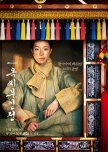
A Tale of Resilience In Joseon Dynasty
This sageuk drama is an emotional journey that delves into the complexities of a slave's life and the brutal hardships they endure. Right from the start, the show captivates with its heartbreaking scenes, exploring themes of oppression, humanity, and resilience. The first four episodes were a perfect 10 for me, with a tight narrative and pacing that never lingered too long. Each plotline feels like it reaches its conclusion just as you're getting hooked, and another compelling arc unfolds seamlessly.The inclusion of LGBTQ+ themes was handled with sensitivity and power, showing how individuals were treated as non-human, which added a layer of depth to the drama. It’s refreshing to see such issues explored in a historical context, giving the show a modern relevance despite its period setting.
One of my favorite elements was the male lead (ML) who brings a refreshing dynamic to the historical genre. Not only is he flirty and charming, but he's also endearing in his lack of fighting prowess, which stands out in the typically action-heavy world of sageuks. The romance is a slow burn, but it’s well-executed, and the chemistry between the leads is palpable, making their relationship feel grounded and authentic.
The familial bond between OK Tae Yeon and her brother-in-law adds another layer of complexity to the narrative. It’s rare to see such a meaningful relationship explored in a sageuk, and the depth of their connection adds a heartwarming touch to the drama.
The second leads also shine here, with performances that stand out just as much as the main cast. Even though the visuals may not have been groundbreaking, they were solid and effectively enhanced the storytelling without distracting from the drama itself.
In conclusion, this drama strikes a perfect balance of emotional depth, historical intrigue, and character-driven storytelling. With a good pace, intriguing plots, strong performances, and relevant themes, it’s a must-watch for fans of sageuks who appreciate more than just sword fights and political scheming.
Was this review helpful to you?

This review may contain spoilers
Great Chemistry, but would've Like Another Ending
Okay, so. I’ve been eyeing this drama for a while, finally gave in when only four episodes were out, and now I’ve finished the whole thing. Whew. I have thoughts. Let’s dive in.First Impressions:
They sold the chemistry in literally two minutes. I was shocked when they kissed in the first five — like hello? That was fast. But it worked. Somehow, it worked. I was immediately curious — what’s their deal? Why are they making out already? Turns out, there’s a whole history, and it’s messy in the best possible way.
The Plot:
So we’ve got Min Jun and Jin Hwan. College friends. Min Jun’s first love. Jin Hwan’s "he might be into me but I’m not sure so let’s just kiss him" moment. Except that moment ruins everything.
Because — plot twist — Min Jun overhears Jin Hwan saying something that sounds like he's about to dump him, sees him with another guy (U Hyeok), and decides to nope out of the entire relationship and city. Ghosts him. Poof.
Fast forward 8 years, these two end up coworkers. Of course. Min Jun is guarded, mature, all “I’m here to work, not relive my emotional damage,” while Jin Hwan is over here like, “I still want you and I’ve been lowkey pining this whole time.”
And the kicker? The whole misunderstanding was... exactly that. A tragic misread that could’ve been avoided if they had just talked for literally 30 seconds. But hey, they were 20. Youth. Mistakes. Drama.
Characters & Acting:
The acting wasgood. Genuinely. These actors gave it depth. Every side-eye, every hesitant smile, every pause in the middle of a sentence — it meant something.
Min Jun: King of Emotional Repression. But like, you get it. His first love blew up in his face and haunted him for eight years. He’s not cold — he’s just scared. The vulnerability behind his walls? Painful. Beautiful. Real.
Jin Hwan: Smooth, charming, way too attractive for my mental peace. He’s sincere though, you feel it. But he’s also kind of impulsive. Kisses first, explains later. A vibe. But sometimes I did want to shake him a little.
And U Hyeok? Surprisingly grounded for the role he had. Iconic best friend. Gave advice that may have wrecked a relationship but hey — he meant well.
OST & Cinematography:
The OST carried so much emotional weight. Soft piano, warm tones, and melancholy in all the right places. And the cinematography? Gorgeous. Lighting, framing, mood — chef’s kiss. Even the most casual scenes felt like poetry.
Top Scenes:
That Intimate Scene in Episode 5? One of the best in BL. Ever. Not just because of the physicality — but the emotion.
Jinhwan kisses him there on the street, it's a little one, a romantic one for the missing and yearning of all the years. And then it's bigger as they let go of what they were holding back.
They go inside, and can't stop touching each other, kissing and holding hands as they slowly undress each other. The kiss on the forehead, the affection.
This might be one of the best intimate scene in a BL tbh. The lighting, the soft music. It was raw.
When minjun stops to remind they'd how to shower and jinhwan says but ‘I like it like this,’ and the smile on minjun!”
The Morning After 2.0: Jin Hwan stays, makes breakfast, lends clothes. A quiet redo of their past. No drama, just domestic softness. Redemption, in the form of eggs and toast.
The Ending (Spoilers ahead):
Okay. Let’s talk.
On paper, it’s a happy ending. They get back together. Jin Hwan doesn’t go abroad. There’s a cute post-credit wedding suit fantasy scene.
But if you really think about it… Min Jun was right. They’re not that compatible. They love each other, sure, but they keep crashing — after a night together, after every attempt at something real. Love alone isn’t enough. They’re too different. They don’t communicate naturally. So as romantic as it was, it also felt… forced? Like the show wanted a soft ending, but the buildup didn’t quite earn it.
Still, I get it. If you turn your brain off and ignore the past two heartbreaks, that last scene is sweet. And I’ll admit — I did smile. But also? I kinda wish they didn’t get back together. Sometimes walking away is the mature, healthier ending. But I’ll just pretend the post-credit was a dream sequence and call it a day.
Final Thoughts:
Great acting.
Beautiful cinematography.
Emotional, sometimes frustrating story.
Best intimate scene I’ve seen in a while.
The airport scene trope needs to retire, thanks.
Was this review helpful to you?

 1
1 5
5 1
1






















